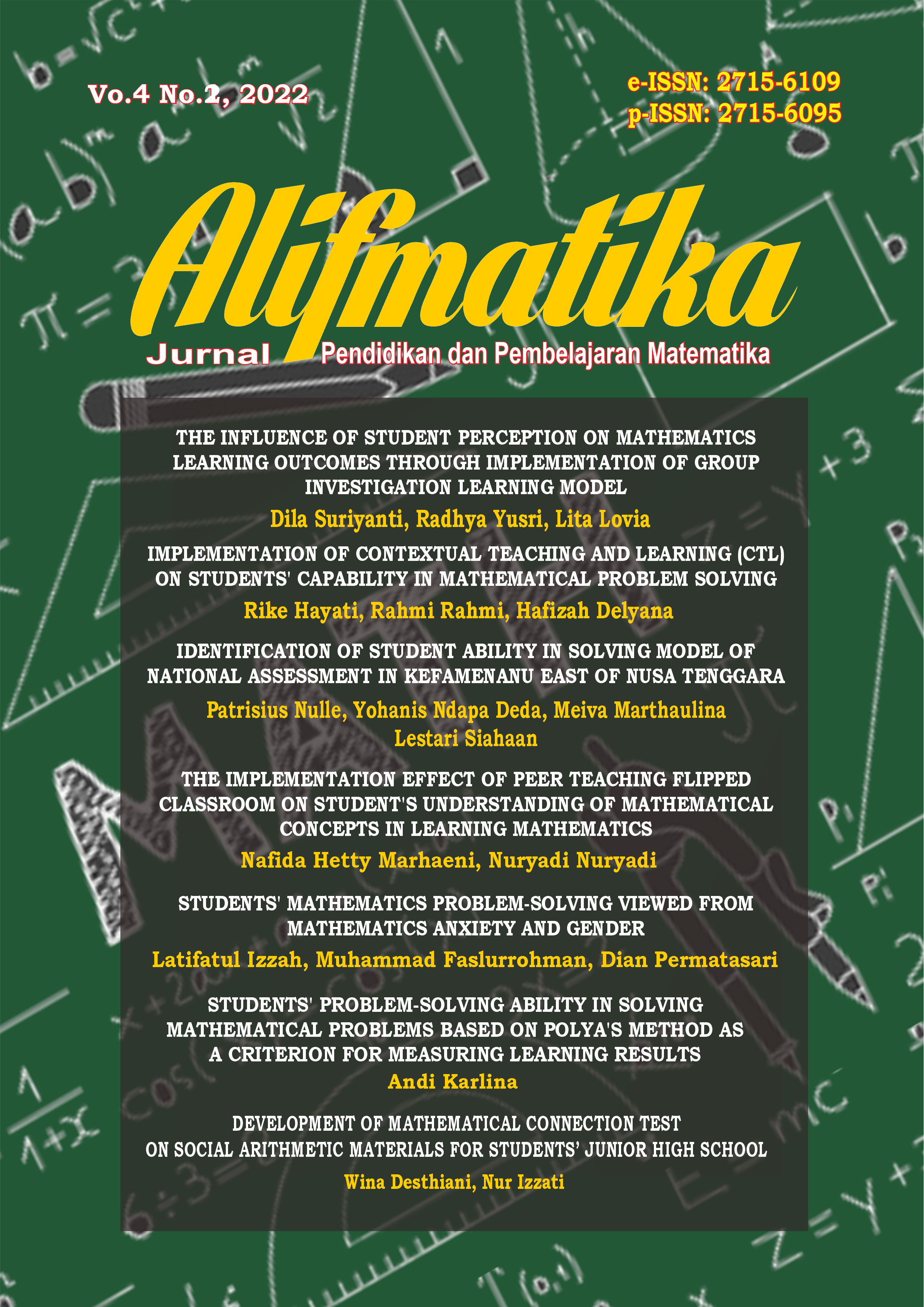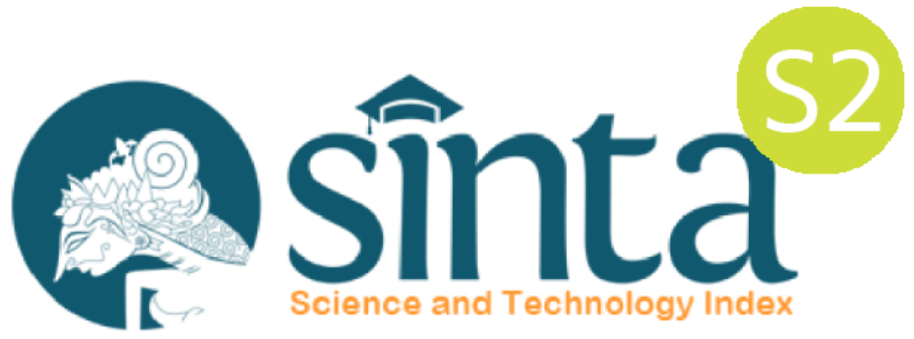THE INFLUENCE OF STUDENT PERCEPTION ON MATHEMATICS LEARNING OUTCOMES THROUGH IMPLEMENTATION OF GROUP INVESTIGATION LEARNING MODEL
DOI:
https://doi.org/10.35316/alifmatika.2022.v4i2.109-121Keywords:
Mathematics, Cooperative, Group InvestigationAbstract
The assumption is that mathematics is a complex subject, and many obstacles still cause low student learning outcomes in implementation. The results of observations that were done in Class XI BDP 1 SMK Negeri 1 Bungo on January 5, 2022, obtained information that during the mathematics learning process, students paid less attention to the teacher when explaining, and students were less enthusiastic. Students lacked the initiative to do practice questions. This study aimed to determine the effect of student perceptions about the application of the Group Investigation cooperative learning model on the mathematics learning outcomes of class X1 BDP 1 SMK Negeri 1 Bungo. This research was pre-experimental with One-Shot Case Study research design. This study's population was all class X1 of SMK Negeri 1, totalling 179, with a sample of class X1 BDP 1 students of SMK Negeri 1 Bungo totalling 22 students. The data analysis technique in this research is descriptive analysis and inferential statistical analysis. Based on the data analysis, it was obtained that tcount = 6,440 and ttable = 1,725, which means tcount > ttable, then reject the HO at a significant level of 0.05 so that it can be concluded that there was an influence on student learning outcomes. That could be seen from the final test that the average score of students exceeds the KKM limit.
Downloads
References
Aditya, R. R. C. (2016). Peningkatan aktivitas dan hasil belajar ipa melalui model pembelajaran kooperatif tipe group investigation pada siswa kelas v SD Negeri 1 Sungapan. Basic Education, 5(38), 3–623. https://journal.student.uny.ac.id/index.php/pgsd/article/view/5384
Adora, N. M. (2014). Group investigation in teaching elementary science. International Journal of Humanities and Management Sciences (IJHMS), 2(3), 146–147. http://ijhms.journalsweb.org/
Akly, N., & Halimah, A. (2015). Efektivitas penerapan model pembelajaran kooperatif tipe group investigation (gi) terhadap hasil belajar fisika. JPF (Jurnal Pendidikan Fisika) Universitas Islam Negeri Alauddin Makassar, 3(1), 52–57. https://doi.org/10.24252/jpf.v3i1.4105
Ambarsari, I. F., Hasanah, N., Azizah, N., Agusti, A., & Yana, I. (2022). Implementasi Belajar Matematika Menyenangkan Berbasis Pembelajaran Game Inovatif di MTS Sarji Ar Rasyid. Jurnal Pengabdian Mandiri, 1(8), 1493–1500. https://bajangjournal.com/index.php/JPM/article/view/3170
Andini, R., Yusri, R., & Lovia, L. (2021). Pengaruh Penerapan Model Numbered Heads Together Terhadap Hasil Belajar Matematika Siswa. Jurnal Equation: Teori Dan Penelitian Pendidikan Matematika, 4(2), 43–54. https://doi.org/10.29300/equation.v4i2.4243
Artini, A., Pasaribu, M., & Husain, S. M. (2015). Penerapan model pembelajaran kooperatif tipe group investigation untuk meningkatkan aktivitas dan hasil belajar IPA pada siswa kelas VI SD Inpres 1 Tondo. Mitra Sains, 3(1), 45–52. http://mrtg.untad.ac.id/index.php/MitraSains/article/view/53
Bate’e, A. (2018). Penerapan Model Pembelajaran kooperatif tipe group investigation untuk meningkatkan motivasi dan hasil belajar Matematika Sd Negeri 4 Idanogawo. Bina Gogik: Jurnal Ilmiah Pendidikan Guru Sekolah Dasar, 2(1). https://www.ejournal.stkipbbm.ac.id/index.php/pgsd/article/view/86
Chairani, Z. (2015). Scaffolding dalam Pembelajaran Matematika. Math Didactic: Jurnal Pendidikan Matematika, 1(1), 39–44. https://doi.org/10.33654/math.v1i1.93
Fikri, A. A., Nurona, A., Saadah, L., Nailufa, L. E., & Ismah, V. (2021). Teacher Skills in Guiding Discussion in Century Learning 21. Journal of Education and Teaching, 2(1), 1–7. https://doi.org/10.35961/tanjak.v2i1.119
Gani, A. (2015). Pengaruh model pembelajaran dan persepsi tentang matematika terhadap minat dan hasil belajar matematika siswa smp negeri di kecamatan salomekko kabupaten bone. Jurnal Daya Matematis, 3(3), 337–343. https://doi.org/10.26858/jds.v3i3.1700
Handayani, F. F., Munawaroh, F., Kurniawan, N. A., & Devianti, R. (2022). Metode Bermain: Upaya Menstimulusi Perkembangan Matematika Anak Usia Dini. Mitra Ash-Shibyan: Jurnal Pendidikan Dan Konseling, 5(02), 73–84. https://doi.org/0.46963/mash.v5i02.529
Kurniawati, I., Sarifudin, S., & Widawati, W. (2021). Analisis Kebutuhan Pengembangan Media Video Pembelajaran Mata Pelajaran Fisika Jenjang SMA. Jurnal Teknodik, 107–118. https://doi.org/10.32550/teknodik.v25i2.733
Mawardini, I. D., & Ningsih, S. S. (2022). Pembelajaran Matematika Kelas IV Madrasah Ibtidaiyah Masa Pandemi Covid – 19. Jurnal Basicedu, 6(2), 2681–2686. https://doi.org/10.31004/basicedu.v6i2.2426
Metroyadi, M. (2014). Meningkatkan Hasil Belajar Siswa Kelas V Konsep Sumber Daya Alam dan Penggunaannya Melalui Model Group Investigation Pada SDN Melayu Tengah Kabupaten Banjar. Tarbiyah Jurnal Ilmiah Pendidikan, 3(2), 91–97. http://eprints.ulm.ac.id/2387/
Muhsin, M., & Munandar, T. A. (2020). Model Pembelajaran Group Investigation untuk Meningkatkan Kemampuan Berpikir Kritis Matematis Siswa. Pedagogik: Jurnal Ilmiah Pendidikan Dan Pembelajaran Fakultas Tarbiyah Universitas Muhammadiyah Aceh, 7(2, Oktober), 179–188. https://doi.org/10.37598/pjpp.v7i2.821
Oktavia, F., & Sofwan, P. Y. (2022). Pengaruh Penerapan Model Pembelajaran Group Investigation Terhadap Keberanian Berpendapat Siswa di SMK Pasundan 2 Cianjur. Jurnal Pendidikan Politik, Hukum Dan Kewarganegaraan, 12(1), 7–17. https://jurnal.unsur.ac.id/jpphk/article/view/2006
Pradhana, V. G., & Pramukantoro, J. A. (2013). Perbedaan Model Pembelajaran Kooperatif Two Stay Two Stray (TSTS) dengan Group Investigation (GI) terhadap Hasil Belajar Siswa pada Kompetensi Menerapkan Dasar-Dasar Teknik Digital. Jurnal Pendidikan Teknik Elektro, 2(2), 661–668. https://ejournal.unesa.ac.id/index.php/jurnal-pendidikan-teknik-elektro/article/view/3351
Rambe, I. W. (2022). Studi Kasus Tingkat Persepsi Siswa SMP Terhadap Pembelajaran Matematika Berbasis Metode Brainstorming di Sekolah. Jurnal Math-UMB. EDU, 9(3), 108–114. https://doi.org/10.36085/mathumbedu.v9i3.3454
Rosa, M., & Orey, D. (2016). Humanizing Mathematics through Ethnomodelling. Journal of Humanistic Mathematics, 6(2), 3–22. https://doi.org/10.5642/jhummath.201602.03
Simanjuntak, S. L., & Siregar, N. (2014). Pengaruh Model Pembelejaran Kooperatif Tipe Group Investigation terhadap Hasil Belajar pada Materi Listrik Dinamis. INPAFI (Inovasi Pembelajaran Fisika), 2(2), 171–179. https://doi.org/10.24114/inpafi.v2i2.1967
Sugiyono, S. (2017). Metode Penelitian Bisnis: Pendekatan Kuantitatif, Kualitatif, Kombinasi, dan R&D. Penerbit CV. Alfabeta: Bandung. https://cvalfabeta.com/product/metode-penelitian-bisnis-pendekatan-kuantitatif-kualitatiff-kombinasi-dan-rd/
Sun, L., Ruokamo, H., Siklander, P., Li, B., & Devlin, K. (2021). Primary school students’ perceptions of scaffolding in digital game-based learning in mathematics. Learning, Culture and Social Interaction, 28(September 2020), 100457. https://doi.org/10.1016/j.lcsi.2020.100457
Thalib, A., Mustafa, K., & Reski, S. (2022). Pengaruh Model Pembelajaran Group Investigation (GI) Berbantuan Media Konkrit Terhadap Hasil Belajar IPA Siswa Kelas IV SD Inpres 1 Donggulu. JURNAL PENDIDIKAN GLASSER, 6(2), 134–140. https://doi.org/10.32529/glasser.v6i2.1516
Wahyuni, S. (2014). Peningkatan Keaktifan Dan Hasil Belajar Ips Melalui Model Group Investigation (Gi) Pada Siswa Kelas Vi Sdn Bandung, Wonosegoro. Scholaria : Jurnal Pendidikan Dan Kebudayaan, 4(3), 97–106. https://doi.org/10.24246/j.scholaria.2014.v4.i3.p97-106
Wiratana, I. K., Sadia, W., & Suma, K. (2013). Pengaruh Model Pembelajaran Kooperatif Tipe Investigasi Kelompok (Group Investigation) Terhadap Keterampilan Proses dan Hasil Belajar Sains Siswa SMP. Journal Program Pascasarjana Universitas Pendidikan Ganesha Program Studi IPA, 3(1), 1–12. https://ejournal-pasca.undiksha.ac.id/index.php/jurnal_ipa/article/view/798
Yavuz Mumcu, H. (2018). Examining Mathematics Department Students’ Views on the Use of Mathematics in Daily Life. International Online Journal of Education and Teaching, 5(1), 61–80. https://search.trdizin.gov.tr/yayin/detay/378389/
Downloads
Published
How to Cite
Issue
Section
License
COPYRIGHT NOTICE
Author (s) who publish in Alifmatika: Jurnal Pendidikan dan Pembelajaran Matematika agree to the following terms:
- The Author (s) submitting a manuscript do so on the understanding that if accepted for publication, copyright of the article shall be assigned to Alifmatika: Jurnal Pendidikan dan Pembelajaran Matematika, Tarbiyah Faculty of Ibrahimy University as the publisher of the journal. Consecutively, author(s) still retain some rights to use and share their own published articles without written permission from Alifmatika: Jurnal Pendidikan dan Pembelajaran Matematika. This work is licensed under a Creative Commons Attribution-ShareAlike 4.0 International License.
- Copyright encompasses rights to publish and provide the manuscripts in all forms and media for the purpose of publication and dissemination, and the authority to enforce the rights in the manuscript, for example in the case of plagiarism or in copyright infringement.
- Alifmatika: Jurnal Pendidikan dan Pembelajaran Matematika and the Editors make every effort to ensure that no wrong or misleading data, opinions or statements be published in the journal. In any way, the contents of the articles and advertisements published in Alifmatika: Jurnal Pendidikan dan Pembelajaran Matematika are the sole responsibility of their respective authors and advertisers.
- The Copyright Transfer Form can be downloaded here [Copyright Transfer Form Alifmatika]. The copyright form should be signed originally and send to the Editorial Office in the form of original mail, scanned document to alifmatika[at]ibrahimy.ac.id or upload the scanned document in the comments column when sending the manuscript.























_by_Matematohir.jpg)






